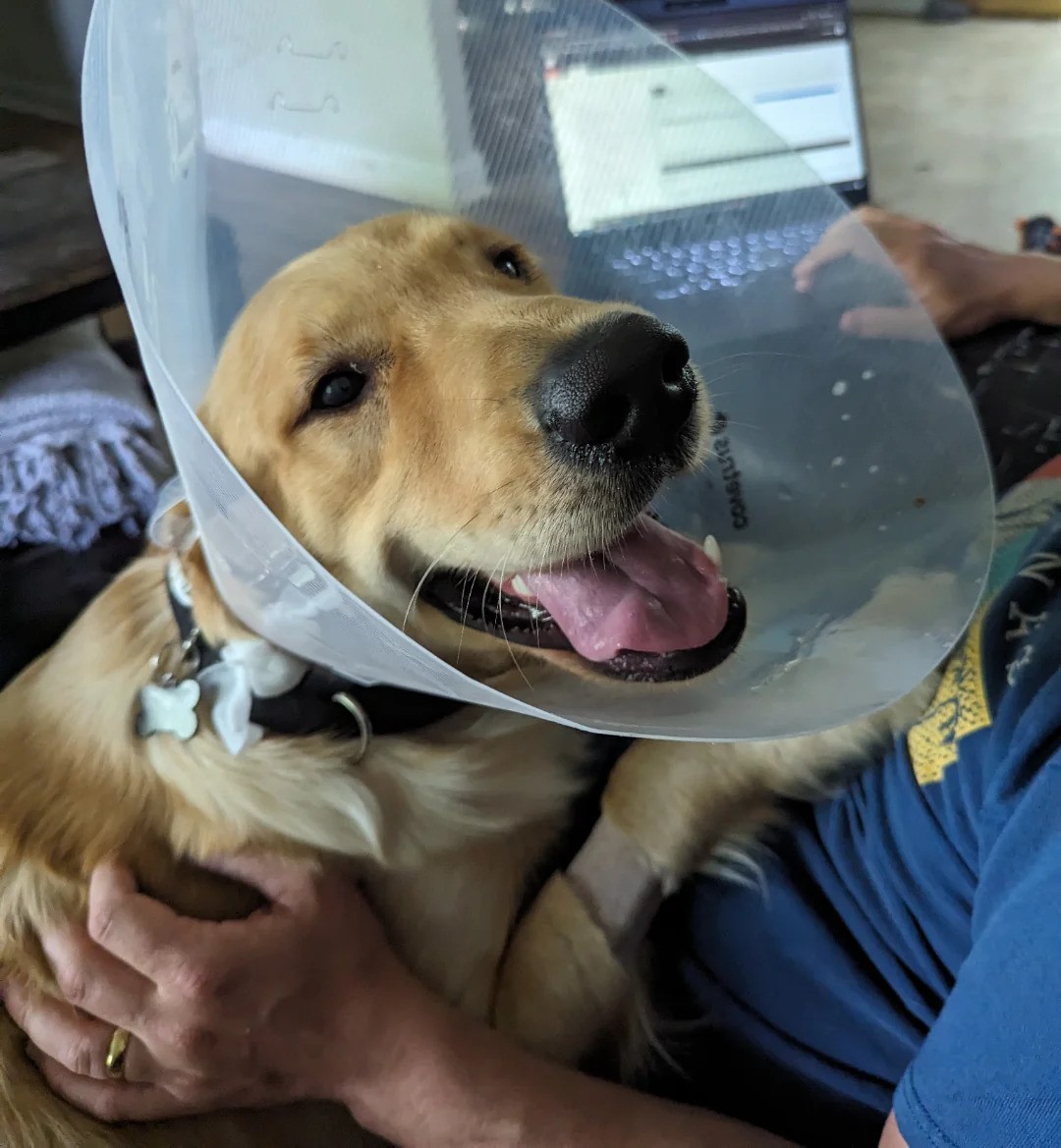Being a pet parent is fun, but what most people don’t tell you is that you will be facing constant dilemmas when it comes to caring for your fur baby. One of them is trying to decide on whether or not to neuter our Golden Retrievers. Our team has spoken with many owners who aren’t sure if they should do it at all, and those who can’t decide when to do it.
In our article, let’s provide you with an expert’s insight into the question “When to neuter Golden Retriever?” so you can craft the best schedule for you and your Goldie.

When to Neuter Golden Retriever: Expert’s Advice
The Optimal Age for Neutering
The question of when to neuter a Golden Retriever has been the subject of extensive research and discussion among veterinary professionals. While traditional advice suggested neutering as early as 6 months, recent studies have led to a shift in this perspective.
| Age Range | Considerations |
| 6-12 months | Traditional recommendation, may reduce certain health risks |
| 12-18 months | Allows for complete skeletal development, potentially reducing orthopedic issues |
| 18-24 months | Ideal for large breeds like Golden Retrievers, balancing health benefits and risks |
As the table illustrates, the ideal neutering age for Golden Retrievers typically falls between 18-24 months. This timing allows for full skeletal maturation, potentially lowering the risk of certain orthopedic problems common in large breeds.
Factors to Consider When Deciding on Neutering
Several crucial factors should be weighed when determining the right time to neuter your Golden Retriever:
- Your dog’s overall health: A comprehensive health assessment is crucial before any surgical procedure. Pre-existing Golden Retriever health issues may influence the timing or even the decision to neuter.
- Behavior and temperament: Neutering can affect a dog’s behavior, potentially reducing aggression and roaming tendencies. However, it’s important to consider your Golden Retriever’s individual personality.
- The purpose of keeping the dog: If you’re considering breeding your Golden Retriever, neutering is not an option. However, for most pet owners, neutering offers numerous benefits.
Advantages and Disadvantages of Neutering Your Golden Retriever
By neutering your Goldie, you are preparing them for a much more comfortable life. Why, you ask? Our veterinarians can give you a long list of the procedure’s health benefits! Here are just some of them:
Advantages of Neutering Your Golden Retrievers

- Avoid accidental pregnancy: Not every dog is suited for breeding. It can be risky if your Golden Retriever possesses faulty genetic features affecting the immune system, respiration, or heart. Since you can’t watch over your dogs 24/7, accidental pregnancies do occur all the time. A surefire way to avoid this is neutering.
- Safeguard your dogs from diseases related to the genital organs: By neutering your dog, you are saving it from the risk of getting testicular cancer – one of the main causes for Golden Retrievers dying younger. Additionally, the surgery reduces the risk of him getting other diseases, such as benign prostatic hyperplasia.
- Calm your dog: Due to their sexual hormone, many male dogs exhibit undesired behaviors. Such behaviors include fighting with other dogs, roaming while seeking female dogs in heat, and randomly whining or howling. According to many owners, these actions’ frequency significantly decline after neutering. Without the distraction of sexual hormones, your Goldie will be calmer, more attentive, and easier to train.
- Keep your house clean: Even after you have potty trained your Golden Retriever, your male dog may still urinate in random locations around the house. This is a heightened territorial behavior driven by their sex hormone. To tackle this problem, the best approach is to neuter him as soon as possible before he develops a pattern.
Potential Risks and Side Effects of Neutering
Like any surgical procedure, neutering your Golden Retriever isn’t without risks. Potential side effects include:
- Anesthesia complications: Golden Retrievers, like all dogs, may react negatively to anesthesia, which can lead to respiratory or cardiac issues. However, these risks are typically low, especially with proper pre-surgery screening.
- Infection: Post-surgery, there’s always a risk of infection at the incision site. This can be minimized with proper post-operative care, but it remains a potential concern.
- Bleeding: While uncommon, excessive bleeding can occur during or after the neutering procedure. Veterinarians take great care to control this risk, but owners should be aware of it, particularly if their Golden Retriever has any underlying health issues.
- Hemorrhage: The most common cause of hemorrhage post-neutering is ligatures that have shifted from their proper position. Veterinarians may employ various techniques to reduce the likelihood of this complication, such as securing the testicular cord with a Miller’s knot.
- Surgical site dehiscence: Self-trauma is the primary cause of surgical site dehiscence in most cases. The use of suitable surgical techniques can reduce the likelihood of self-trauma and, consequently, dehiscence. When sealing the wound, the surgeon should avoid stitching too tightly. Tight sutures cause pain and discomfort, resulting in a higher chance of self-trauma. Furthermore, to keep dogs from injuring their incision during their recovery, owners can have them wear Elizabeth collars.
An important thing to emphasize is that the risk of getting side effects is considerably low. What’s more, most of them can be avoided if you perform the neutering procedure at a reliable vet that follows proper surgical protocols and provides thorough post-operative care. By taking that into consideration, you will see how the benefits of neutering outweigh its drawbacks.
Neutering Golden Retrievers: The Procedure
Pre-operative Preparation
Proper preparation is key to a successful neutering procedure:
- Fasting for 8-12 hours before surgery
- Pre-anesthetic blood work to ensure overall health
- Consultation with your veterinarian about any concerns
Surgical Procedure
The neutering procedure, known as an orchiectomy, involves:
- Administering general anesthesia: Your Golden Retriever will be put under general anesthesia to ensure they remain unconscious and pain-free throughout the procedure.
- Making an incision: The veterinarian will make a precise incision in front of or on the scrotum to access the testicles. The size of the incision can vary depending on your dog’s size and age.
- Removing the testicles: The vet will carefully remove both testicles, eliminating the ability to reproduce and preventing future health issues such as testicular cancer.
- Closing the incision: Once the testicles are removed, the incision is closed using sutures, which may be dissolvable or require removal during a follow-up visit. Proper post-operative care will help the wound heal smoothly, reducing the risk of complications like infection.
Post-operative Care

Proper post-operative care is crucial for a smooth recovery:
- Restricting activity for 10-14 days
- Monitoring the incision site for signs of infection
- Administering prescribed pain medication
- Preventing licking or chewing of the surgical site
- Feed your pet high-quality dog food for Golden Retriever
Conclusion
The optimal age to neuter a Golden Retriever typically falls between 18-24 months. Neutering offers numerous health and behavioral benefits, and while risks exist, the advantages usually outweigh them. Proper pre-and post-surgery care is essential for a smooth process. As a veterinary expert, I recommend discussing when to neuter your Golden Retriever with your vet for personalized advice based on your dog’s health and circumstances. Neutering is a significant decision that promotes your pet’s long-term well-being and responsible pet ownership.

As a professional writer who specializes in canine care, I have spent a significant amount of time researching and writing about Golden Retrievers. While I do not own a Golden Retriever, my considerable research and collaboration with doctors, breeders, and Golden Retriever experts has provided me with a lot of information about this incredible breed. My writing covers a wide range of topics, from food and health concerns to behavior and training, to assist owners in raising well-rounded, healthy golden retrievers. Through this website, I wish to share my knowledge and positively touch the lives of both dogs and their humans.

